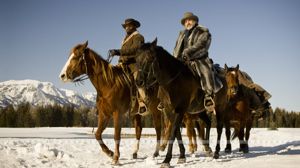I'm not sure how, but you handled it. Whatever crazy request Tarantino had, you managed to make it work. "I need a horse have its head blown off. And another who goes in circles. And one with pretty spots. Trudge that one through deep snow. And all the horses over there - blow them up." No wonder he bragged about your work so early in the credits, stating how no animals were harmed during filming. The experience of making Django Unchained must have been similar to watching it - a crashing booming spectacle. It's an inglourious and propulsive mashup that it has little time for questions or answers, because it is so completely compelled by awesome.
The premise and storyline directly support this commitment. Django (a 100% bad-ass Jamie Foxx) is freed from slavery in return for helping Dr. King Schultz (Christoph Waltz), a German dentist-turned-bounty-hunter, identify his next kills. The two team up, earning more bounties, until they turn their attention to freeing Django's wife Broomhilda (Kerry Washington) from the slave driving clutches of Calvin Candie (Leonardo DiCaprio) and Stephen (Samuel L. Jackson). The good guys are capable, the ladies lovely, and the villains terribly evil. It's a perfect setup for justifying just about anything that follows.
But as I am sure you know, even simple premises risk falling down in execution. Especially when they are Tarantino-complex. Like a broad collection of horse-and-rider stunts, the entire movie is an assemblage of scenes and ideas developed elsewhere. We've seen this all before - in Mandingo, Drum, Roots, The Searchers, The Wild Bunch, and more. The thing is, an old trick in a new environment can work wonders on an audience. So the result is almost completely enjoyable.
All the actual horse stunts were flawless, to my eyes. Ambition met skill perfectly. The film itself, on the other hand, sometimes trips and falters while trying to combine so much at once. At almost three hours, pacing becomes crucial, and some scenes limp instead of gallop. Tarantino's cameo falls flat on it's face. And a few times, I was left wondering if a scene was actually going anywhere. The audience laughed every time Samuel L. Jackson said anything, which was confusing, but a credit to the zeal with which Jackson actually donned metaphorical blackface.
Django Unchained's failures are borne out of Tarantino's love of his ideas and influences (his own metaphorical blinders), but because it comes from a good place, like a loyal steed, I'll forgive him. Even if it's not his best performance.
Giddyup,
Cory








